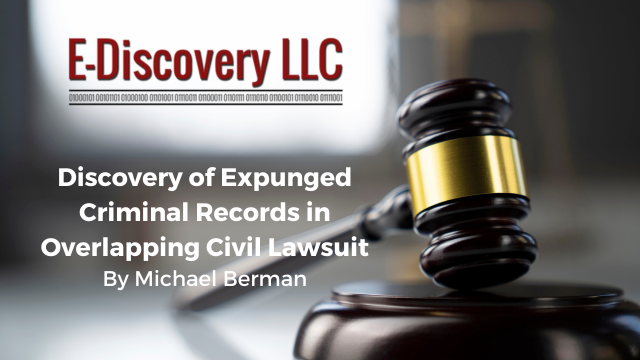
In In re Expungement Petition of Franics A., 2023 WL 5948060 (Appellate Ct. of MD Sept. 13, 2023)(unreported), the intermediate appellate court resolved a novel discovery issue. The Appellate Court affirmed a decision that good cause had been shown to open, review, and disclose information contained in Francis A’s expunged criminal records.
Just as “deleted is not deleted” in the world of ESI forensics, “expunged” is not always “expunged.” If there is “good cause,” expunged records may be discoverable, and “good cause” is a flexible concept.
“’Expunge’ means to remove information from public inspection in accordance with this subtitle.” Md. Code Ann., Crim. Proc. Art. § 10-101.
However, there is an exception. In §10-108(d), the Criminal Procedure Article of the Maryland Code states that:
A court may order the opening or review of an expunged record or the disclosure of information from that record:
(1) after notice to the person whom the record concerns, a hearing, and the showing of good cause….
In Francis A, two women sued “A” in federal court for violent sexual assaults. They also filed a State-court “Petition to Allow Inspection of Expunged Records” (the “Petition to Allow Inspection”). The allegation in both cases was that “B” had been romantically involved with “A,” and that “A” had sexually assaulted “B’s” younger sister. “B” confronted “A” and sustained serious injuries.
All of the criminal charges were either nolle prossed or resulted in a not guilty verdict. They were subsequently expunged.
In the federal civil action, the plaintiffs sought access to arrest and incident reports, search warrants, affidavits, forensic reports, witness statements, and other documents in the files of the police and prosecutor, as well as court records. “A” objected and the Petition to Allow Inspection followed.
The State Circuit Court held that good cause had been shown to obtain the requested records because of issues in the expunged records that overlapped the federal action.
On appeal, “A” first asserted that discovery should be denied because the expungement statute failed to define “good cause.” The Appellate Court disagreed, noting that statutes often do not define that phrase. It cited precedent holding that what constitutes “good cause” is a discretionary decision guided by the context of the action. It described the phrase as “flexible.”
The purpose of expungement is to prevent a person from unfairly suffering the stigma of a criminal charge that did not result in conviction. “A” asserted that the discovery requests contravened that purpose, while the plaintiffs argued that there was nothing “unfair” about their discovery requests due to the overlapping factual issues in the federal court lawsuit. They also pointed to a “robust” confidentiality agreement in federal court.
“A” also asserted that the plaintiffs had not exhausted other avenues of discovery. However, the plaintiffs responded that “B,” who had been in a coma, had no memory of the attack, and that fact was undisputed. It was also undisputed that “A” and “B” were alone at the time of the attack.
The Circuit Court Judge considered all of these “unique facts and circumstances” when exercising discretion to make the good cause determination. The Appellate Court held that the trial court’s decision was not “well removed from any center mark” and was not “beyond the fringe of what [this] [C]ourt deems minimally acceptable” and affirmed.
Just as “deleted is not deleted” in the world of ESI forensics, “expunged” is not always “expunged.” If there is “good cause,” expunged records may be discoverable, and “good cause” is a flexible concept.


